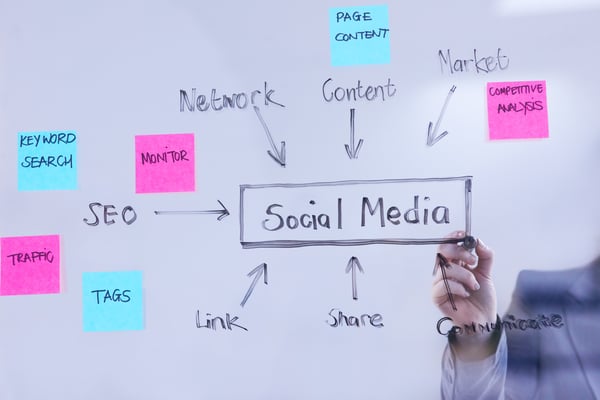
"If you build it, they will come." If only that were true when it came to e-commerce! However, the reality is that in a supersaturated global market, it is all too easy for your company to go unnoticed by the majority of your consumers, even if you are selling a superior product compared to the competition.
That's where an efficient digital marketing strategy comes into play. It's how you get noticed; it's how you stand out from the crowd. But perhaps you may wonder: "What is involved in crafting and implementing a successful marketing plan? How can I leverage outstanding digital marketing practices for the benefit of my online store?"
This article will cover 12 aspects of a killer digital marketing strategy, and why each one is so important to the success of an e-commerce company. Moreover, these 12 points also serve as good reasons why you should hire a digital marketing agency, (especially if you feel like you would be in over your head when it comes to implementing each of these tactics)!
First things first: you need to have a plan in place before you can ever hope to achieve results from your digital marketing efforts. In the planning phase, it's important to have a thorough knowledge of your business and your consumer base as a starting point, so that you can effectively prioritize certain areas of advertising above others.
For instance, if you know that your product is more popular among young people that regularly engage with social media platforms, then you may decide to place more emphasis on social media marketing than other initiatives. Whatever the case, be sure to have a solid plan in place before investing heavily in one particular aspect of digital marketing. At the same time, don't fear to adjust your plan as your business grows.
Search engine optimization is one of the absolute best ways to attract customers to your business. When SEO is done right, it's like you're enlisting Google as an ally in the quest to drive traffic towards your website.
Of course, you need to generate content that is not only relevant to searcher intent, but also adds real value to the user. Over time, blog posts and articles that add real value to your customers and other Internet users will gain more shares, likes, and backlinks. These "votes of confidence" will, in turn, cause Google to view your site as an authority on the subject in question. Finally, this will cause your site to surge in Google's SERP rankings.
It's a beautiful cycle.
Pay per click campaigns are a bit of a shortcut to increased revenue, but are effective nonetheless. In short, you pay Google to feature an ad from your company on certain search results pages, and then you pay a certain rate for each click that is generated.
While this may seem like a dangerous tactic, the truth is that PPC campaigns can be very profitable. In fact, on average businesses gain $2 for every $1 spent on Google Ads.

A company's website basically serves as its "storefront" or "front door" in today's world. You want your website to be intuitive and easy to use, so that instead of customers bouncing off your site like its a trampoline, they'll want to hang around a little bit longer... and perhaps purchase one or two more items.
Especially when starting out, it's important to regularly post to your company's blog. Every time you publish a new blog post or article, Google's crawlers (little robots that search for new web pages) will capture it for Google's index.
Over time, your regularity in publishing new blog posts will feed into your SEO scores. That's in addition to the credibility your company will gain through week in and week out consistency, along with an increasing base of followers.

Social media marketing's ROI is tricky to define. One thing is certain, however: social media is an excellent platform to increase brand exposure. In addition, you can leverage social media to enhance your company's image, and connect with your consumer base on a more personal, individual level.
Social media marketing may not have the bottom line return on investment of other marketing tactics, but it often produces the most dedicated and loyal customers.
Email marketing is a cost-effective way to reach a broad demographic. Of course, any marketing emails that you send out should be distinct from your competitors, highly professional, and never carry even a whiff of being spam.
Interestingly, in terms of revenue generation about 59% of B2B marketers cite email marketing as their most effective advertising channel. Clearly, there's a lot of potential benefits that email marketing can offer you as an e-commerce merchant.
As your company progresses in its marketing strategy, and utilizes increasingly sophisticated tactics, you're bound to capture large amounts of customer data. Marketing analytics tools allow you to leverage that data to your advantage.
For example, by using advanced analytics you'll be able to determine which products are your best-sellers, which customer demographics should be your primary targets, and how your customers prefer to interact with online stores.
Re-marketing and re-targeting are like that second free throw: it's your second chance to "score" with a customer. Here's an example: using customer tracking technology and your analytics tools, you can determine what a visitor to your website was looking at before he or she bounced from the page. Then you can personalize any future advertisements, either on your site, via email, or through other channels, to match his/her likely interests.
As your company grows, you'll definitely want to establish clear procedures for what constitutes an MQL (marketing qualified lead) versus an SQL (sales qualified lead). Instead of risking annoyance to your prospective customers, or even losing sales over misunderstandings as to buyer intent, use a clear and logical lead management workflow to smoothly and seamlessly assist the buyer in his journey through the funnel.
A good CRM (customer relationship management) system is a wonderful thing to have when it comes to effective marketing. CRM platforms and other marketing automation tools take a lot of the day to day operational burden of marketing off your shoulders. You simply need to establish clear parameters for the tasks they will perform, and then let them go!
Google offers a number of excellent marketing tools, such as Enhanced Ecommerce, that can help you to see how far your shoppers are going into the sales funnel, and where they are dropping off; which of your products are most popular among your consumer base; and how your customers are interacting with your products.
Eniture Technology specializes in helping e-Commerce merchants grow by providing useful information, digital marketing services, off-the-shelf apps that solve common problems, and custom programming services. Please contact us if you need help growing your online business or implementing the concepts presented in this blog post.
Interested in learning more? Start with our free guide on how to increase online sales, and subscribe to our blog!
GET IN TOUCH
Phone: 404.369.0680
info@eniture.com
320 W. Lanier Avenue
Suite 200
Fayetteville, GA 30214
© 2015 Eniture LLC. All rights reserved.